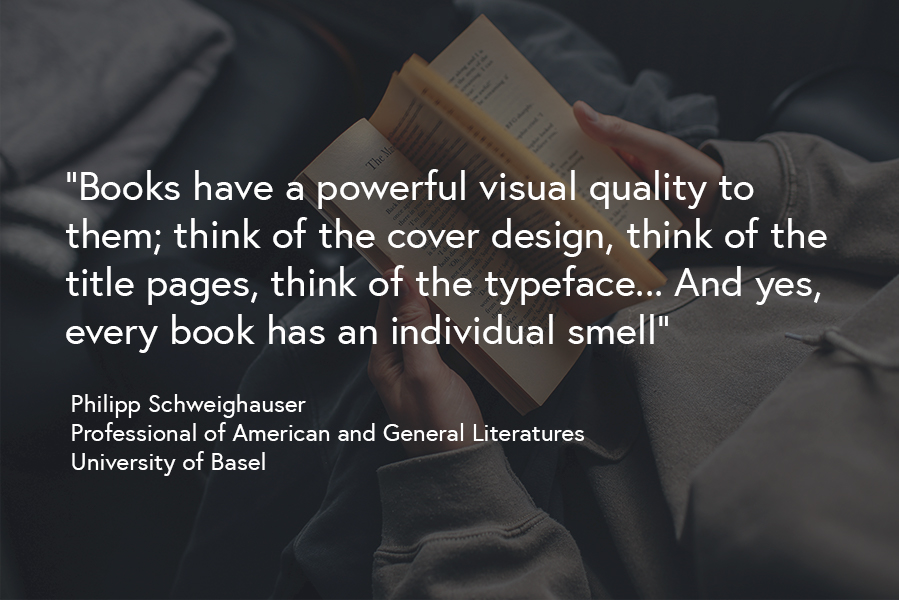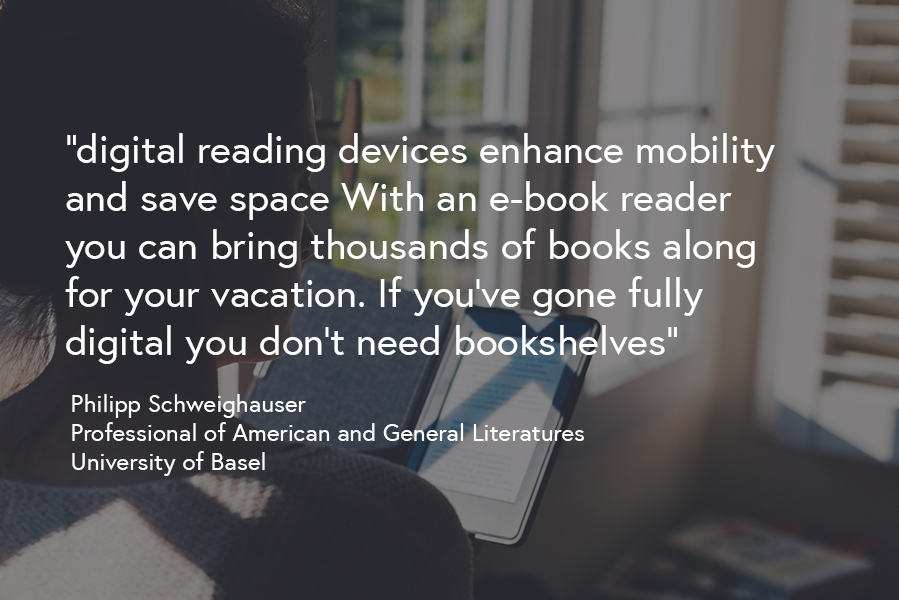Interview: How do we read literature in the digital age?
In this post Gaudenz Metzger, from the University of Basel, interviews Philipp Schweighauser, a literary scholar and Professor of American and General Literatures also at the University of Basel. Ahead of Basel’s course Literature in the Digital Age: from Close Reading to Distant Reading, they discuss everything from print, to emoji to computers writing books.

In the past decades computers have radically changed society. The digital revolution has had a powerful effect on lots of fields, including communication, economics, art and science. The impact of digital technology is visible almost everywhere in our lives: shaping social behaviour and mentality but also practical skills like cooking, driving and reading.
In recent years, the study of literature has undergone significant changes in response to the digital revolution. The shift towards digital forms of reading and computer-based forms of literary analysis opened up new and exciting questions for literary scholars all over the world – including Philipp Schweighauser, lead educator in the upcoming course Literature in the Digital Age: From Close Reading to Distant Reading. I asked him about his own reading habits, the relation between digital media and literature and the future of reading and writing.
Gaudenz Metzger (GM): Professor Schweighauser, can you tell us about your personal reading strategies? Do you prefer analogue books or digital devices or a mix of both?
Philipp Schweighauser (PS): For the greatest part, I still read my novels, short stories, poems, and plays in print. So for poetry and fiction, it’s mostly print. The reverse is true for scholarship, which I read in electronic form whenever available. What I appreciate most about e-texts is their ready availability, their ‘searchability’ and the ease with which I can excerpt quotes for my own scholarship. I’m greatly interested in how the learners in Literature in the Digital Age read literary and other texts, and we’ll have a discussion about this in the first week.
GM: It’s often said young people prefer reading electronically. But print hasn’t disappeared. Why does the analogue continue side by side with the digital in the 21st century?
PS: There is a sensual quality to print books that e-books lack. Whenever we hold a book in our hands, we feel its size, its weight, and the quality of paper that is used. Thus, for many readers out there, it still makes a great difference whether they read a paperback or a hardback, a print-on-demand book or a collector’s edition. Books also have a powerful visual quality to them; think of the cover design, think of the title page, think of the typeface that is used. And yes, every book has an individual smell. In the final week of the course, we’ll delve deeply into the question of the sensuality and materiality of books. There are also scientific studies which suggest that we can remember texts we have read in print better that texts read on digital devices. For literary scholars, printed literary texts also remain crucial because the authoritative/scholarly editions that we quote often aren’t available in digital and/or quotable form.

GM: How has our increasing use of e-book readers and tablets changed the way we read literature?
PS: On the most pragmatic level, digital reading devices enhance mobility and save space. With an e-book reader, you can bring thousands of books along for your vacation. If you’ve gone fully digital, you don’t need book shelves anymore. With many an e-book reader, you can also instantly look up words you do not understand or find out more about the history of characters and the places they live in. And if it’s your sort of thing, you can also find out which passages in the book you’re reading other readers have found most interesting. More ominously, some brands allow you to monitor and reward the reading progress of your children. As this example shows, the promises of new technologies can easily transform into pitfalls–the great Canadian media theorist Marshall McLuhan, something of a patron saint for week 6 of Literature in the Digital Age–speaks of ‘reversal’ in this context, the point at which the promises of new technologies revert into their opposites. Think of how email promises to facilitate communication, but think also of the dread you feel when you open your inbox after a vacation–if you managed to stay away from it at all during what is supposed to be your time off. Less dramatically, the additional features of new reading technologies can also distract us, yanking us out of what many of us enjoy most about reading literature: losing ourselves in different, fictional worlds.

GM: Media (books, tablets, smart phones etc.) are not just tools that help us read and communicate; they also open new perspectives and produce knowledge. Are there new and surprising ways of seeing that come from using digital media in literary studies?
PS: In recent decades, what is called ‘digital humanities’ has gained increasing prominence in research and teaching institutions all over the world. The term means different things to different people, but basically, the idea is that we need to find new ways of harnessing the potential of digital tools and databases in the study of culture. This ranges from large-scale digitizations of archives to developing online courses such as Literature in the Digital Age. Within literary scholarship, the Italian literary scholar Franco Moretti has been promoting what he calls ‘distant reading’ since around the turn of the millennium. Distant reading is a literary-critical method developed in direct opposition to the time-honoured practice of close reading. Instead of analyzing, as close readers do, individual literary texts with the utmost precision, distant readers mine huge databases containing thousands of literary texts to discover large-scale developments in literary history and patterns that transcend national boundaries. In Literature in the Digital Age, we’ll explore both more traditional forms of literary scholarship that remain crucial such as close reading and historical contextualization and more recent reading strategies developed in response to the digital revolution: hyper reading, social reading, surface reading and distant reading.
GM: So far we’ve talked about reading strategies but if you think about things like emojis, the computer is also modifying the way we write. Do you think human language and expression will undergo a fundamental change in the next centuries?
PS: This wouldn’t be surprising since technological inventions have radically impacted human language and expression throughout the history of humankind. Think of the invention of the phonetic alphabet in the 2nd millennium BCE, think of the invention of the printing press in the mid-15th century, think of the invention of the telephone, the typewriter and the tape machine in the late 19th and early 20th centuries. All of these technologies have fundamentally changed the way humans lived their lives, communicated, and perceived their world. For instance, if we follow Marshall McLuhan, the invention of the printing press created a whole new world in which print was the dominant medium and sight the dominant sense. McLuhan called it the Gutenberg Galaxy and already in the 1960s announced that it was in demise. He believed that humankind had entered a new phase by then: the electric age, a culture of all-at-onceness in which everyone is connected to everyone else and the world had become what McLuhan calls a ‘global village.’ This should ring familiar to anyone living in the digital age, but Intel’s invention of the microprocessor in 1971, the emergence of the Internet and of social networks, and, most recently, the rise to prominence of machine learning have certainly introduced further radical changes, among them the virtual disappearance of letter writing, the blurring of the boundaries between speech and writing and the emergence of new forms of writing such as texting and twitter. The social and psychological effects of these new media and new cultural forms will continue to be felt for decades to come, but I’m a literary scholar rather than a prophet or futurologist, so I’ll abstain from predictions.
GM: In the future computers may dream and write world literature. Is this a possible scenario for you?
PS: Again, I’m wary about that whole business of prophecy, but this seems a rather unlikely scenario to me. Sure, with the help of machine learning, computers will become ever more adapted at emulating neuronal processes and producing texts that pass the Turing test, but culture–the world of signs and meanings–will remain a predominantly human sphere. Even if computers do one day dream and write halfway decent literary texts, who will analyze those dreams and who will enjoy those texts? Computers?
Learn more about these and other topics. Join Literature in the Digital Age: from Close Reading to Distant Reading.




